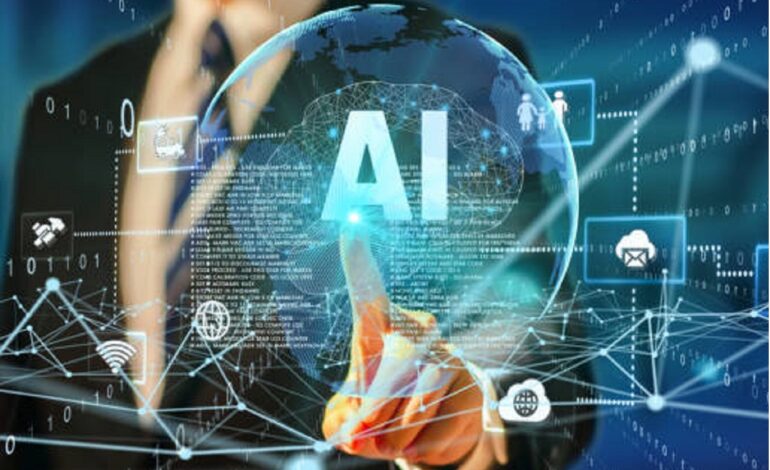AI’s Ascent: Transforming Indian Industries by 2025

The Rise of AI in Indian Industries: A Deep Dive into 2025 and Beyond
Artificial intelligence (AI) is no longer a futuristic fantasy; it’s rapidly becoming an integral part of the modern global landscape. And India, with its vast population, burgeoning economy, and unique challenges, is poised to be a significant beneficiary – and contributor – to this AI revolution. This post will explore how AI is being adopted across key Indian industries, examine specific case studies demonstrating real-world impact, and delve into the potential we can expect by 2025 and beyond.
AI Adoption Across Key Sectors in India
The adoption of AI in India isn’t uniform; different sectors are embracing it at varying paces depending on their specific needs and opportunities. Let’s examine some key areas:
Agriculture: Transforming Farming Practices
India’s agricultural sector, vital for both the economy and food security, faces challenges like unpredictable weather patterns, pest infestations, and inefficient resource utilization. AI is offering solutions to these problems.
- Precision Agriculture: AI-powered image recognition from drones and satellites can analyze crop health, identify areas needing attention (fertilizer, water), and predict yields with remarkable accuracy. Companies like Cropin Technology Solutions are leading this charge, providing platforms that integrate satellite imagery, weather data, and soil sensors to optimize farming practices.
- Pest & Disease Detection: Machine learning models trained on vast datasets of images can identify pests and diseases early, allowing farmers to take preventative measures before significant damage occurs. This reduces pesticide usage and improves crop quality.
- Automated Irrigation: AI algorithms can analyze soil moisture levels and weather forecasts to determine the optimal irrigation schedule, conserving water and maximizing yields.
Manufacturing: Boosting Efficiency and Quality
The manufacturing sector in India is undergoing a significant transformation driven by Industry 4.0 principles, with AI playing a crucial role.
- Predictive Maintenance: AI algorithms analyze sensor data from machinery to predict potential failures *before* they happen, minimizing downtime and reducing maintenance costs. Companies like Unboxd Robotics are deploying solutions for predictive maintenance in factories across India.
- Quality Control: Computer vision systems powered by AI can inspect products on assembly lines with far greater speed and accuracy than human inspectors, identifying defects early and improving product quality.
- Process Optimization: AI can analyze production processes to identify bottlenecks and inefficiencies, suggesting improvements that lead to increased throughput and reduced waste. L&T’s Applied Intelligence business is actively involved in providing these types of solutions.
Healthcare: Improving Patient Outcomes & Accessibility
India’s healthcare system faces challenges like limited access, shortage of qualified medical professionals, and rising costs. AI offers opportunities to address these issues.

- AI-Powered Diagnostics: Machine learning algorithms can analyze medical images (X-rays, CT scans) to detect diseases such as cancer with high accuracy, aiding radiologists in making diagnoses more quickly and efficiently. Qure.ai is a prominent example, offering AI solutions for radiology diagnostics.
- Personalized Medicine: Analyzing patient data – including genetics, lifestyle, and medical history – allows AI algorithms to predict individual risk factors and tailor treatment plans accordingly.
- Virtual Assistants & Chatbots: AI-powered chatbots can provide basic medical information, schedule appointments, and triage patients, freeing up valuable time for healthcare professionals.
E-commerce: Enhancing Customer Experience and Operations
The Indian e-commerce market is booming, and AI is essential for maintaining competitiveness.
- Personalized Recommendations: AI algorithms analyze customer browsing history and purchase behavior to provide personalized product recommendations, increasing sales.
- Chatbots for Customer Service: AI chatbots can handle routine customer inquiries, providing instant support and improving customer satisfaction. Flipkart utilizes this extensively.
- Fraud Detection: Machine learning models can identify fraudulent transactions in real-time, protecting businesses and customers from financial losses.
- Supply Chain Optimization: AI algorithms can optimize logistics and warehousing operations, reducing costs and improving delivery times.
Specific Case Studies Showcasing AI’s Impact
Let’s look at a few specific examples:
- Aurobindo Pharma & AI-Powered Drug Discovery: Aurobindo Pharma is using AI platforms to accelerate drug discovery, reducing the time and cost associated with bringing new medications to market.
- Reliance Jio’s Predictive Maintenance for Telecom Infrastructure: Reliance Jio leverages AI for predictive maintenance of its extensive telecom infrastructure, minimizing downtime and ensuring network reliability.
- Tata Steel & AI-Driven Quality Control: Tata Steel utilizes computer vision systems powered by AI to detect defects in steel production, improving product quality and reducing waste.
The Future Potential of AI in India – Looking Towards 2025
By 2025, we can expect even more widespread adoption and sophistication of AI across Indian industries.
- Increased Automation: Expect significant increases in automation across various sectors, leading to improved efficiency and productivity. Robotics, particularly collaborative robots (cobots) working alongside humans, will become more common.
- AI-as-a-Service (AIaaS): The rise of AIaaS platforms will make AI technology accessible to smaller businesses that may not have the resources to develop their own solutions in-house.
- Edge AI: Processing data at the edge, closer to the source (e.g., on devices), will become more prevalent, enabling real-time decision-making and reducing latency, especially important for applications like autonomous vehicles and industrial automation.
- Focus on Ethical AI: As AI becomes more pervasive, there will be increasing scrutiny of its ethical implications – bias in algorithms, data privacy concerns, and the impact on employment. Expect greater emphasis on developing and deploying AI responsibly.
- Government Initiatives: The Indian government’s National Strategy for Artificial Intelligence aims to promote research, development, and adoption of AI technologies, which will likely lead to further investment and innovation. NITI Aayog’s role in this is crucial.
Challenges & Considerations
While the potential of AI in India is immense, several challenges need to be addressed:
- Data Availability and Quality: Many AI applications require large amounts of high-quality data for training. Addressing data scarcity and ensuring its accuracy are crucial.
- Skills Gap: There’s a shortage of skilled AI professionals in India. Investing in education and training programs is essential.
- Infrastructure Limitations: Reliable internet connectivity and computing power are necessary to support widespread AI adoption, particularly in rural areas.
Conclusion:
The rise of AI in Indian industries is inevitable and represents a tremendous opportunity for economic growth and social progress. By addressing the challenges and fostering innovation, India can harness the power of AI to transform its economy and improve the lives of millions.



